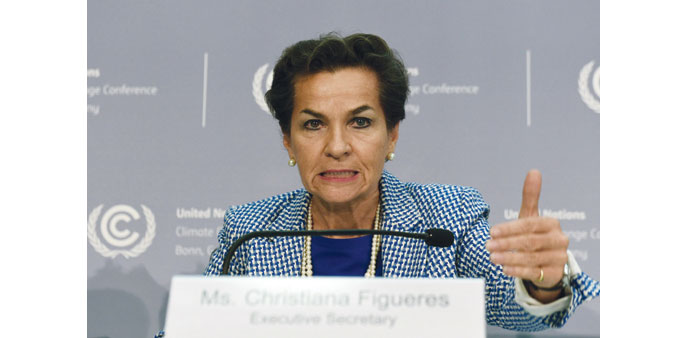Thomson Reuters Foundation
Bonn
Governments have begun negotiating on an updated draft of a global climate change deal that was released yesterday morning at the latest round of UN talks in Bonn, amid relief new additions had not seen the text balloon.
Developing countries voiced anger at the beginning of the talks on Monday that a slimmed-down 20-page version of the text, created by the chairs of the negotiations, had not included key proposals on issues like helping people deal with the impacts of climate change and financing their protection.
In response, all countries were permitted to insert “must-have items”.
The resulting new text, issued overnight, is 34 pages long, and was described by climate experts as “manageable”.
“Fears (it) would expand out of control were laid to rest,” said Nozipho Joyce Mxakato-Diseko, South Africa’s delegate, who speaks on behalf of a key group of more than 130 developing nations and China.
Daniel Reifsnyder, co-chair of the talks, said the new text was now the “starting point of the negotiation” aimed at producing a binding agreement to curb global warming.
That deal is due to be finalised by more than 190 nations at a UN conference in Paris starting on November 30.
French Foreign Minister Laurent Fabius told negotiators in Bonn there was a need for confidence, transparency and a sense of urgency at the talks this week to ensure success in Paris.
“I am sure that a series of improvements will be brought to ensure the text is balanced and ambitious,” and can be used as a starting point for the Paris summit, he added.
He said he hoped the Bonn discussions would settle some important issues and identify some key political questions remaining open.
Peter Betts, lead negotiator for the European Union, said the new draft text was a “useful tool” but there was still a long way to go before all countries agreed which essential elements should be part of the deal.
Seven smaller groups are now setting to work in Bonn on discussing different sections of the draft agreement covering emissions reductions, climate finance, and adapting to extreme weather and rising seas, among other issues.
Some countries said they would use those sessions to try to reintroduce certain proposals, as they were unhappy not all their suggestions yesterday had been included.
Civil society groups were furious that they will not be allowed to attend the sub-group meetings - a stance backed by Japan and the co-chairs, and opposed by Malaysia and others.
But in general, the mood in Bonn was that the new text now reflected a broader range of views from both developed and developing countries.
Mohamed Adow, senior climate change advisor with development charity Christian Aid, said a delicate balance had been struck in crafting a fair premise for negotiations, opening the way to defining clear options for ministers to grapple with in Paris.
He welcomed the reintroduction of a developing-world proposal on dealing with the losses and damage caused by unavoidable climate impacts; another linking adaptation needs with the level of temperature rises; and a long-term goal to decarbonise the global economy over the course of this century.
“Given the drama yesterday ... I am pleased to say we’re far ahead into the process in terms of actually having a solid draft text that will be the basis for negotiation,” Adow said. “We can now get on with the job at hand.”
Talks co-chair Reifsnyder said a further revised version of the draft deal would be produced at the end of Friday, when the Bonn talks close.

Christiana Figueres, executive secretary of the UN Framework Convention on Climate Change (UNFCCC), addresses a press conference at the UNFCCC summit
